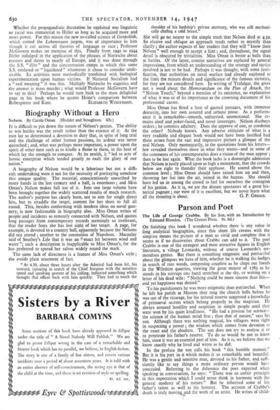Biography Without a Hero
Nelson. By Carola Oman. (Hodder and Stoughton. 42s.)
IT is difficult to pin down the nature of Nelson's genius. The ability to win battles was the result rather than the essence of it. At the root lay so determined a devotion to duty that, in spite of long trial and the challenge of other human passions, its ardour was never quenched ; and, what was perhaps more important, a power upon the spirit of other men such as to kindle a flame in them, in the heat of which lay the strength to conquer. At its zenith, it " led to acts of heroic enterprise which •tended greatly to exalt the glory of our nation."
A biography of Nelson would be a laborious but not a diffi- cult undertaking were it not for the necessity of portraying somehow this unique quality. The material, conscientiously unearthed by many hands in the last century and a half, is enormous ; and Miss Oman's Nelson makes full use of it. Into one large volume have been brought together the widely scattered results of much research. The author's purpose has clearly been, not to aim for single direct hits, but to straddle the target, content for her shots to fall all round. This, besides conforming with modern ideas on naval gun- nery, is now fashionable in biography also. Miss Oman writes of people and incidents so remotely connected with Nelson, and quotes long passages from contemporary records seemingly so irrelevant, that the reader fears she has lost sight of her target. A page, for example, is devoted to a country ball, apparently because the Nelsons did not attend ; another to the coronation of Napoleon. Macaulay said of Southey's Life that it was an"-exact hit between wind and water "; such a description is inapplicable to Miss Oman's, for she has preferred to spread her salvos widely round the mark.
The same lack of directness is a feature of Miss Oman's style ; she avoids plain statement of fact.
"At 4.30, about three hours after the Admiral had been hit, his steward, tiptoeing in search of the Chief Surgeon with the noiseless speed and speaking gesture of his calling, indicated something which brought that officer back with him quickly. They had to touch the shoulder of his lordship's private secretary, who was still mechani- cally chafing a cold breast."
She will go no nearer to the simple truth that Nelson died at 4.3o. So elusive and oblique an approach tends rather to mystify than clarify ; the author expects of her readers that they will " know their 'Nelson " well enough to accept a hint ; and, throughout, the signal detail is obscured by trivialities. Miss Oman is better at balls than at battles. Of the latter, concise narratives are replaced by general impressions, from which an understanding of the strategy and tactics involved is not to be had. , Perhaps it was thought, with some justi- fication, that authorities on naval warfare had already explored to the limit the minute details and significance of the famous victories, for they are not considered here. In writing of Trafalgar, she gives not a word about the Memorandum on the Plan of Attack, the " Nelson Touch," beyond a mention of its existence, no explanation of what it was or of its importance as the crowning document of his professional career.
Miss Oman has fitted a host of quoted passages, with immense dexterity, into her own assured and urbane prose. As a perform- ance it is remarkable—smooth, unhurried, unemotional. She re- mains aloof and poker-faced, and never interrupts. Nelson disobeys orders ; he commits adultery. Does she approve of one, or condemn the other? Nobody knows. Any adverse criticism of what is a very readable and elegant book would not have been justified had there arisen from the vast and impressive picture a glimpse of the real Nelson. Only morne4;uarily, in the quotations from his letters— few revealed themselves more in what they wrote—and in some of the comments of his contemporaries does a vision of the man appear ; then to be lost again. What the book lacks is a downright admission that Nelson is justly placed upon so high a monument, that the crowds below are right to thunder their applause. He soared above the common level ; Miss Oman should have raised him up and then, throwing her hat into the air, joined in the huzzas. She should have led us in among the crowd to feel for ourselves the contagion of his genius. As it is, we are the distant spectators of a great his- torical pageant ; our view of it is excellent, but we never learn what






























 Previous page
Previous page